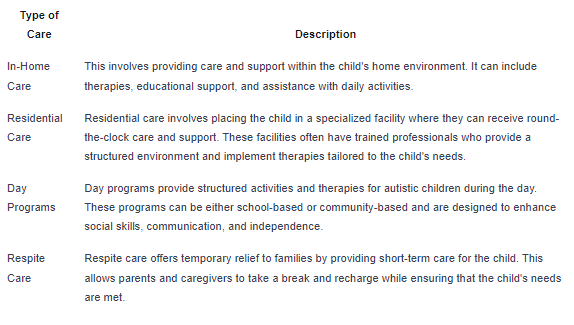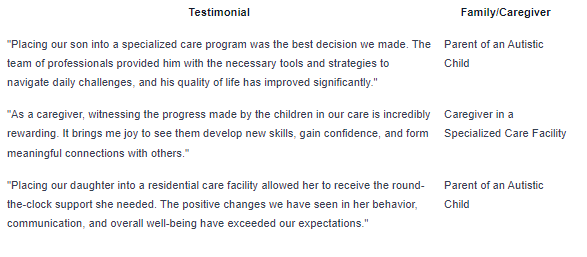Can Placing an Autistic Child into Care be a Positive Step?
Discover how placing an autistic child into care can transform lives! Real success stories and positive outcomes await.

Understanding Autism and Care Options
When it comes to caring for autistic children, it's important to have a thorough understanding of autism spectrum disorder (ASD) and the different care options available. This section provides an overview of ASD and explores the various types of care that can be beneficial for autistic children.
Autism Spectrum Disorder Overview
Autism spectrum disorder is a neurodevelopmental condition that affects individuals in varying degrees. It is characterized by challenges in social interaction, communication difficulties, and repetitive behaviors. Autism is a lifelong condition, but with the right support and interventions, individuals with autism can lead fulfilling lives.
ASD is a spectrum disorder, meaning that it encompasses a wide range of abilities and challenges. Some individuals may have mild symptoms and require minimal support, while others may have more significant impairments and require more intensive care.
Different Types of Care for Autistic Children
When it comes to caring for autistic children, there are various options available, depending on the individual needs of the child and the resources available to the family. Here are some common types of care for autistic children:

It's important to evaluate the unique needs of the child and consider factors such as their level of support required, the availability of resources, and the preferences of the family when determining the most suitable care option. Consulting with professionals and seeking guidance from autism support organizations can help families make informed decisions about the care of their autistic children.
Challenges Faced by Families
Raising an autistic child can present unique challenges for families, requiring significant physical, emotional, and financial resources. Understanding and addressing these challenges is essential for parents and caregivers to provide the best possible care for their child.
Daily Struggles
Families of autistic children often face daily struggles that can impact various aspects of their lives. These struggles can include:
- Communication difficulties: Autistic children may have challenges in expressing their needs and emotions, leading to frustration and miscommunication.
- Behavioral challenges: Some autistic children may engage in repetitive behaviors, have sensory sensitivities, or exhibit challenging behaviors that can be difficult for families to manage.
- Routine disruptions: Autistic children often thrive on routines and predictability. Any disruptions to these routines can cause distress and difficulty for both the child and their family.
- Specialized care and attention: Autistic children may require additional support and supervision, which can be physically and mentally demanding for families.
- Social isolation: Families may experience social isolation due to the unique needs of their autistic child. It can be challenging for families to engage in typical social activities as they navigate their child's care.
Emotional and Financial Stress
Caring for an autistic child can also lead to emotional and financial stress for families. These stressors can include:
- Emotional impact: Parents and caregivers may experience a range of emotions, including stress, worry, guilt, and exhaustion. The constant demands of caring for an autistic child can take an emotional toll on families.
- Financial burden: The cost of therapies, interventions, and specialized resources for autistic children can be significant. Families may face financial strain as they try to provide the necessary support for their child's development and well-being.
- Time commitment: Caring for an autistic child often requires a significant time commitment. This can result in parents and caregivers having limited time for themselves, their relationships, and other responsibilities.
Navigating these challenges can be overwhelming for families, and it is important for them to seek support and resources. Placing an autistic child into care can help alleviate some of these challenges and provide specialized support and services that can improve the overall quality of life for both the child and their family.
Benefits of Placing Autistic Children into Care
Placing an autistic child into care can be a positive step for both the child and their family. It provides access to specialized support and services tailored to their unique needs, ultimately leading to an improved quality of life for the child.
Specialized Support and Services
When an autistic child is placed into care, they gain access to a range of specialized support and services designed to meet their individual needs. These services may include:
- Therapeutic Interventions: Care providers trained in autism spectrum disorder (ASD) can offer various therapeutic interventions such as Applied Behavior Analysis (ABA), speech therapy, occupational therapy, and social skills training. These interventions target specific areas of development and help enhance the child's communication, socialization, and daily living skills.
- Individualized Education: Care facilities often provide individualized educational programs that focus on the child's strengths and challenges. These programs are designed to support their learning style and promote academic progress.
- Structured Environment: Many autistic children thrive in structured environments that provide predictability and routine. Care facilities can offer a structured setting where daily routines, schedules, and visual supports are implemented to create a sense of stability and reduce anxiety.
- Experienced Staff: Care providers who have experience working with autistic children have a deep understanding of their unique needs. They possess the knowledge and skills to effectively manage challenging behaviors, facilitate communication, and create a supportive and nurturing environment.
Improved Quality of Life for the Child
Placing an autistic child into care can significantly improve their overall quality of life. Here are some ways in which this transition can positively impact the child:
- Enhanced Socialization: Care facilities often provide opportunities for social interaction with peers who are also on the autism spectrum. This socialization can foster friendships, promote social skills development, and reduce feelings of isolation.
- Tailored Learning: Specialized educational programs and individualized attention in care facilities can maximize the child's learning potential. By addressing their specific educational needs, these programs can help the child make progress academically and develop essential life skills.
- Access to Therapeutic Resources: Care facilities can provide access to a range of therapeutic resources that may not be readily available within a family's home environment. These resources can aid in the child's development and help manage any behavioral or emotional challenges they may face.
- Respite for Families: Placing an autistic child into care can provide much-needed respite for families who may face daily struggles and emotional stress. It allows parents and caregivers time to recharge, focus on their own well-being, and maintain a healthy balance between their responsibilities and personal needs.
It's important to note that every child is unique, and the decision to place an autistic child into care should be made on an individual basis, considering the child's specific needs and circumstances. Seeking professional guidance and evaluating the factors involved can help families make an informed decision that will ultimately benefit the child's well-being and overall development.
Positive Impact on Families
Placing an autistic child into care can have a positive impact on the entire family. It not only provides specialized support and services for the child but also brings about significant benefits for the parents and siblings. Let's explore two key positive outcomes of placing autistic children into care: reduced stress and burnout and strengthened family relationships.
Reduced Stress and Burnout
Caring for an autistic child can be both physically and emotionally demanding for parents. The constant attention, round-the-clock care, and additional responsibilities can often lead to high levels of stress and burnout. Placing an autistic child into specialized care can help alleviate these challenges and provide parents with much-needed relief.
By sharing the caregiving responsibilities with trained professionals, parents can have the opportunity to take care of their own well-being. This can include attending to their physical and mental health, pursuing personal interests, and spending quality time with other family members. The reduced stress and burnout not only benefit the parents themselves but also contribute to a healthier and more stable family environment.
Strengthened Family Relationships
Placing an autistic child into care can also have a positive impact on family relationships. Siblings of autistic children may experience unique challenges and may sometimes feel neglected due to the demands of caring for their sibling. With the child in specialized care, parents can focus on nurturing stronger relationships with their other children, providing them with the attention and support they need.
Moreover, the reduced stress and burnout experienced by parents can create a more harmonious and supportive family dynamic. Parents can have more energy and emotional availability to engage with their children, strengthen bonds, and create positive memories together. This contributes to a healthier family unit and fosters an environment of love, understanding, and support.
In summary, placing an autistic child into care has a positive impact on families by reducing stress and burnout for parents and strengthening family relationships. The specialized care provided to the child allows parents to prioritize their own well-being while nurturing stronger connections with their other children. It is important for families considering this step to carefully evaluate their options and seek professional guidance to ensure the best possible outcomes for everyone involved.
Success Stories
Placing autistic children into care can often lead to remarkable positive outcomes for both the child and their family. Real-life examples and testimonials from families and caregivers highlight the transformative power of this decision.
Real-Life Examples of Positive Outcomes
Here are a few real-life examples that demonstrate the positive impact of placing autistic children into care:
- Case Study 1 - Emily: Emily, a 10-year-old girl with autism, struggled with daily routines and social interactions. After being placed into a specialized care program, she received tailored support and therapy. Over time, Emily's communication skills improved, and she developed a sense of independence. Today, she is a confident teenager who actively participates in school activities and has formed meaningful friendships.
- Case Study 2 - Alex: Alex, a 7-year-old boy on the autism spectrum, faced challenges in managing his emotions and engaging in social interactions. Placing him into a care program that provided a structured environment and individualized support made a significant difference. With the help of skilled caregivers and therapists, Alex learned coping strategies and social skills. He now thrives academically, interacts positively with peers, and demonstrates improved emotional regulation.
- Case Study 3 - Sarah: Sarah, a 12-year-old girl with autism, experienced difficulties with sensory sensitivities and self-care routines. After being placed into a specialized residential care facility, she received consistent support from a team of professionals. Through sensory integration therapy and personalized routines, Sarah's sensory sensitivities reduced, and she gained confidence in managing her daily activities independently.
These real-life examples illustrate the potential for positive growth and development when autistic children are placed into care that offers specialized support and services.
Testimonials from Families and Caregivers
Testimonials from families and caregivers further emphasize the positive impact of placing autistic children into care:

These testimonials reflect the relief, gratitude, and optimism experienced by families and caregivers when autistic children are placed into care.
By sharing real-life examples and testimonials, we can shed light on the positive outcomes that can be achieved through placing autistic children into care. These stories highlight the importance of access to specialized support and the significant positive impact it can have on the lives of autistic children and their families.
Considerations Before Placing a Child into Care
Before making the decision to place an autistic child into care, it is important for families to carefully evaluate various factors. This decision should be made with the guidance of professionals who can provide valuable insights and support.
Factors to Evaluate
When considering placing an autistic child into care, families should assess the following factors:
- Child's Needs: Evaluate the specific needs of the child, including their level of independence, communication abilities, and behavioral challenges. Understanding the child's individual requirements will help in finding the most suitable care option.
- Family Support: Consider the level of support available within the family. Assess the physical, emotional, and financial capacity of the family members to provide the necessary care for the child. This evaluation will help determine if additional support from professionals or caregivers is needed.
- Care Options: Explore the different types of care available for autistic children. This can include specialized residential facilities, day programs, respite care, or in-home support services. Research and understand the specific services and resources offered by each option to determine which aligns best with the child's needs and the family's goals.
- Professional Recommendations: Seek input from professionals who have experience working with autistic children. They can provide valuable insights based on their expertise and help assess the child's unique needs. Professionals such as doctors, therapists, and educators can guide families in making an informed decision.
- Financial Considerations: Evaluate the financial implications of placing a child into care. Determine the costs associated with different care options, including fees, insurance coverage, and any additional expenses. Understanding the financial aspect will help families plan and budget accordingly.
Importance of Professional Guidance
Making the decision to place an autistic child into care is a significant step that requires careful consideration. Seeking professional guidance is crucial in the decision-making process. Professionals who specialize in autism can provide valuable advice, recommendations, and support tailored to the child's individual needs.
These professionals can conduct assessments, provide information about available care options, and offer guidance on accessing funding or support services. They can also help families navigate the emotional aspects of this decision, offering reassurance and addressing any concerns they may have.
By involving professionals, families can gain a comprehensive understanding of the options available and make an informed decision that is in the best interest of the autistic child and the entire family.
Considering the factors discussed above and seeking professional guidance will help families navigate the complexities of placing an autistic child into care, ensuring that the decision is well-thought-out and based on the child's unique needs and the family's circumstances.
Sources
https://www.goldenstepsaba.com/resources/can-i-put-my-autistic-child-into-care
https://www.yellowbusaba.com/post/can-i-put-my-autistic-child-into-care
Similar articles
We’re here to help you

Our team is here to assist you in this process. Contact us for any assistance.
it’s easy to apply
We Accept Most Insurances
Our in-network insurance partnerships make ABA therapy more accessible to families throughout our service areas.







Our Insurance Process
We'll request your insurance details to help us verify your plan's coverage for ABA therapy. Once we've received this information, we'll walk you through your benefits, including copayments, deductibles and out-of-pocket maximums, so you know what to expect in advance.
Our team will then handle the preauthorization and all the necessary paperwork.
.svg)





















.jpeg)


































.jpeg)




.jpeg)







.jpeg)











.jpeg)
















